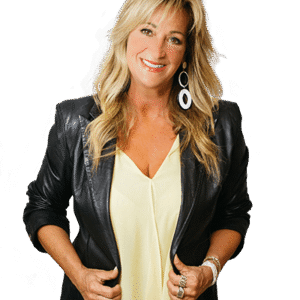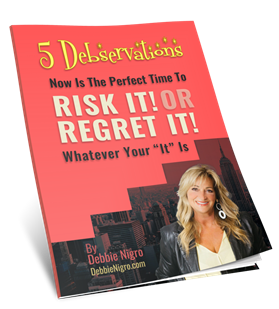Hey friends, Debbie Nigro here—and yes, I was literally clapping for collagen on the air.
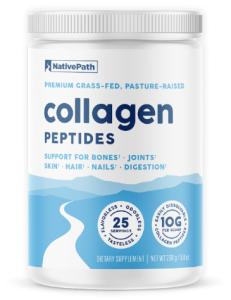
I’ve officially joined the collagen revolution thanks to NativePath, and I feel GOOD.
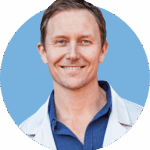
So good, I invited their brilliant co-founder, Dr. Chad Walding, on The Debbie Nigro Show to talk more about this stuff that’s got my knees, skin, hair, and even my outlook bouncing back.
I knew something was up with collagen when I became aware just how many people I know seem to be taking it. I was interested in trying it, but held off because I could never decide on which brand I trusted. Then as luck would have it I spotted a gal pal from my past in a NativePath collagen ad and sent her a text asking... ‘does this stuff really work’? Her upbeat answers led to my inviting her to join my Wellness Wednesday edition of my radio to show to share her experience.
After that I started taking NativePath Collagen myself and began educating myself more about collagen in general.
According to Grand View Research…
Collagen Market Size & Trends
The global collagen market size was valued at USD 9.9 billion in 2024 and is projected to grow at a CAGR of 11.3% from 2025 to 2030 due to the growing health and wellness trends, along with expanding application areas. Consumers increasingly prioritize natural, sustainable products for skin care, joint health, and overall well-being, contributing to a rising demand for collagen supplements. Collagen’s versatility in industries, particularly in cosmetics, food and beverages, and pharmaceuticals, further fuels its market growth. As the awareness of collagen’s benefits for anti-aging, gut health, and muscle recovery spreads, its adoption in diverse products continues to increase, propelling the market to new heights.
U.S. Collagen Market Trends
The U.S. held a considerable position in the collagen industry in 2024, spurred by the increased demand for grass-fed and sustainable collagen. Consumers are becoming more conscious of the ethical sourcing of their products, leading to a preference for grass-fed collagen, which is perceived as cleaner and more natural.
Collagen Is the Missing Link
Dr. Chad Walding explained that our ancestors used to get collagen naturally from eating “nose to tail.” But today? We’re practically collagen-starved—relying on packaged junk, added sugars, and zero bone broth. Not ideal for staying alive and kicking over 50!

Why Grass-Fed Collagen Matters
Dr. Chad broke down the difference between “happy cows” (grass-fed, hormone-free, sunshine-loving) and sad factory-farmed ones. NativePath’s collagen comes from cows living their best lives—which means better results for your bones, joints, and glow.
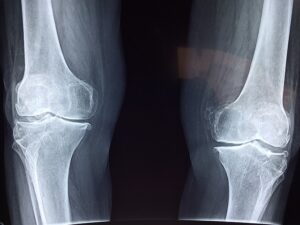
Reasons to Take Collagen After 50
Here are just a few:
1. Bone-on-bone pain? Collagen helps rebuild joint tissue.
2. Calcium confusion? Turns out, collagen—not calcium—is the real MVP for bone strength.
3. Skin, hair, and nails? Fast improvement. My hair grew so fast I need to color it more often!
4. Better recovery, more energy, smoother digestion, and the list goes on…

Not All Collagen is Created Equal
Most of what’s out there is low-quality, smelly, clumpy, or made from fish or chicken—not ideal.
NativePath sticks with type 1 and type 3 bovine collagen, the exact kind our bodies crave.
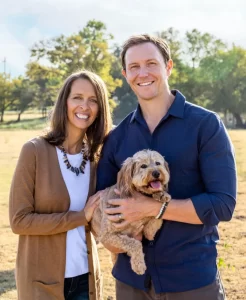
Dr. Chad Walding, Co-Founder of NativePath is passionate about sharing his little-known tips for supporting bone density, soothing joint discomfort, and boosting mobility. I found his information truly enlightening.
I encourage you to go to this link (lovenativepath.com/alive) and read…
7 reasons everyone over 50 should be taking THIS kind of protein
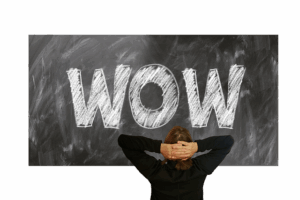
For those who don’t know, declining bone and joint health is a major reason we feel sore and stiff in the mornings.

But most importantly, Dr. Chad Walding has seen people achieve incredible reversals with a simple nutritional fix.
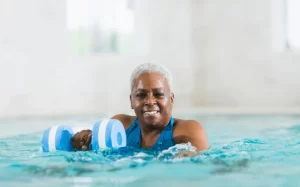
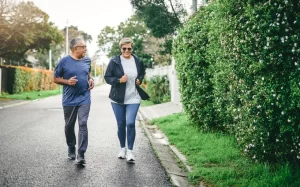
Something this simple could help you regain independence and mobility…even if you think it’s too late.
I’m In—and Feeling It
I now put NativePath collagen in my coffee every morning. It’s tasteless, clump-free, and now for me… non-negotiable based on what I’ve learned.
Want to hear the full conversation? Don’t miss this episode of The Debbie Nigro Show. Or you can read the transcript of our conversation below.
Learn more about how collagen might really help you and then get some asap at lovenativepath.com/alive.
The Debbie Nigro Show has a special offer waiting for you there.
Because guess what?
Your best days are NOT behind you!

AUDIO TRANSCRIPT:
0:00:00
(Speaker 2)
And now, back to the Debbie Nigro Show! I love clapping along. I’m one of those clappers. Hey guys, I’m clapping for collagen this morning. Who knew I’d be doing that, like for real. I am. And I’m very excited that I have changed my ways and I’m hoping for the best here at the Debbie Nigro Show and in my life going forward. You know I’m all about keeping the living alive and I know there are certain things you need to take, you need to, that I wasn’t, that I now am, thanks to Native Path, which
0:00:59
(Speaker 2)
is an amazing company that I found out about from, as you’ve heard me say on the show, a gal pal who I spotted in one of their ads saying, hey this stuff really helped me, my knees don’t hurt as much, my skin, my hair, my… I’m like I got to get some of that stuff. So I did. I’m very proud now that I’m involved with Native Path as a sponsor of this short-form radio feature that I just created called Keeping the Living Alive with Debbie Nigro. And so I wanted to meet their co-founder, Dr. Chad Walding. I’ve been reading all about him. And today is the day I get to do that. And you do too. Welcome to my show, Dr. Chad Walding.
0:01:33
(Speaker 1)
Hello, Debbie. So good to be here with you. Great to meet you as well.
0:01:36
(Speaker 2)
Thank you so much. And by the way, congratulations. This is a, I know it’s a passion project for you, but you built some incredible company. And I just want to congratulate you because I know your mission behind doing this is real and that you really want everybody to have a better quality of life. And goodness knows, as I joke, we’re blowing body parts every week here. We can just get a couple of things we know that are not offensive to put in our bodies and we don’t have to worry about that are healthy for us,
0:02:05
(Speaker 2)
then we’re all in better shape. So let’s talk a little bit about your background. You’re a Doctor of Physical Therapy, correct?
0:02:10
(Speaker 3)
That’s right.
0:02:11
(Speaker 1)
I’m a Doctor of Physical Therapy. I, you know, I spend a lot of time in hospitals, spend a whole lot of time in outpatient clinics, treating people with back pain and neck pain and knee pain and things like that. And I also spent a lot of time going into people’s homes doing home health physical therapy. So treating people who weren’t strong or well enough to go to a clinic. And that really opened up my eyes to a lot of things, really seeing the environments
0:02:33
(Speaker 1)
that people live in, what kind of foods they eat, watching them watch commercials and TVs, telling them to eat foods that are bad for them and then take a pill, you know, really getting the big clue that like we have a food industry that knows nothing about health, a health industry that knows nothing about food. So I got really passionate about nutrition. You know, I’m an athlete as well.
0:02:52
(Speaker 1)
So I was always looking at nutrition to help me become stronger and faster and win the race and lift more weight and things like that. And everything I was learning was really highlighting the changes that have happened in the past hundred years with the modern diets, you know like the commercialization of food the industrialization of food the added sugars the seed oils the
0:03:13
(Speaker 2)
It’s amazing. I mean, you know, you just walk through a supermarket, right? And and you look through you just go through the aisles. You’re like, oh my god Like like 89% of this stuff is really bad for you
0:03:24
(Speaker 3)
Yeah, it’s nothing that our great-grandparents whatever recognizes suit, you know Oh my God, like 89% of this stuff is really bad for you.
0:03:25
(Speaker 1)
Yeah, it’s nothing that our great-grandparents would ever recognize as true, you know? And along with that, over the past 100 years, there’s been a radical rise in disease in our world, right? Like chronic disease, for instance, has just spiked through the roof, heart disease, diabetes.
0:03:42
(Speaker 1)
So I was like, why is all this happening? And I noticed in the conventional healthcare environment, no one was really ever talking about nutrition, you know, and I really believe nutrition can be the solution. It’s the cause to a lot of our problems, our poor nutrition, but I think it can also be the solution to a lot of our health issues if we get it right.
0:04:02
(Speaker 2)
Right. And as you’re talking, I’m like, nobody’s ever walked into a hospital room and said, come on, here, eat this, here’s all this broccoli and vegetables and this is how you’re going to get better. Nobody’s ever done that.
0:04:12
(Speaker 1)
You know, Debbie, what really, what really, look, it’s an aha moment for me. You mentioned hospital room, right? internship I had was at a heart hospital. It was world-renowned for its treatment heart disease and on the first floor of this heart hospital was a McDonald’s, right? And like I’m not getting out, I’m getting in. I’m gonna tell you the truth and I was so confused. Like I would treat patients who would get out of heart surgery and they would ask me to wheel them down to eat a Big Mac and I would go down there and I would see doctors and nurses also eating that food. So I was really seeing like a huge disconnect
0:04:48
(Speaker 1)
between nutrition and health and really wanted to do something about it. So you know I got my start really educating people about this. I would go to physical therapy clinics and various gyms and just telling people you know about these changes that we’ve seen in the modern diet and really encouraging them to start eating whole real food and get back to the basics the
0:05:07
(Speaker 2)
things that are most important. Right now this whole thing we’re going to lead toward because I want to discuss the seven reasons everybody over 50 should be taking this kind of protein. I just before we get to that the grass-fed collagen the cows that where’s all the way you you getting all this stuff? How’s this happening?
0:05:27
(Speaker 1)
Yeah, well, when we get into collagen, like we wanna back up a little bit and as I was looking at things, right? I was looking at what is missing in our modern diet, right? What are the ways our ancestors were eating that we’re just completely absent on today?
0:05:40
(Speaker 1)
And one of the biggest things I’ve noticed was collagen. So collagen is a protein. Some people call it a protein, some people call it a molecule, but it’s really what makes up the structure of your body, right? And our ancestors would get plenty of collagen in our natural diets because they would take the bones of an animal, they would put it in a soup, they would make broth, they would
0:05:59
(Speaker 1)
eat nose to tail. It was a part of their natural diet and in our modern diets, we get almost virtually no collagen at all and on top of that, we’re really protein deficient and we’ve been bombarded with carbohydrates and sugars and refined processed foods that are lacking a lot of nutritional value that really help us build up the structure of our body. So I began learning about collagen and how important it is and and then using it for myself and my
0:06:25
(Speaker 1)
patients and seeing great results and like improved knee pain and back pain and better recovery after surgeries and things like that. I noticed a better performance in my fitness. So I became a huge, huge fan of collagen.
0:06:38
(Speaker 2)
Okay. So I want to talk about the reasons but I still got the cows in my head. This is grass-fed. You know, I don’t have time to boil bones and most people I know don’t, right? So, what, how do you, just can you give me the cow, like how you get this stuff and then
0:06:54
(Speaker 2)
we’ll go through the why nobody wants bone-on-bone and how this is going to help?
0:06:57
(Speaker 1)
That’s exactly right. Yeah. So we have a saying at Native Path that you’re not just what you eat, you are what you eat eats and the source matters. The life that a cow lives drastically impacts the quality of the collagen that you put in your body. So when you go to the Amazon and you see most of the collagens out there or you see an ad somewhere, you go to the grocery store, a lot of that collagen is coming from very poorly
0:07:21
(Speaker 1)
sourced cows. Those cows are living on dirt, they’re living in feedlots, they’re like they’re packing them in a little corral and they’re giving them they’re giving them grains and and and corn and things like that and cows aren’t meant to eat grains or corn they’re meant to eat grass so those cows will get sick and because they get sick they give them antibiotics and because they want to get more product they give them hormones and fatten them up. And what happens there is you’re getting a product that’s not very bioavailable to you and it’s not very efficacious.
0:07:47
(Speaker 1)
It’s not doing what it wants to do, right? Now if you take a cow that’s living the way it’s designed to eat, and that’s kind of what we’re doing at Native Path. We’re trying to get humans to eat the way they’re designed to eat, right? A cow should be living on grass. It should be roaming hills, getting sun, drinking fresh water, should never be giving any any hormones or antibiotics and things like that. So the purity is very important when it comes to quality of the collagen and you can
0:08:12
(Speaker 1)
compare the differences. Like if you take a good grass-fed collagen like what we have at Native Path and you compare that to a lot of the other collagens out there, it is drastically different. Ours is pure, it’s tasteless, it’s odorless, it’s not clumpy in your tea or your coffees or your smoothies and things like that. If you take a standard collagen from the market, it’s going to be yellow, it’s going to smell bad, it just doesn’t mix well. And because of that, it just doesn’t give you the results. It’s not as nutrient dense and it’s not as
0:08:42
(Speaker 1)
bioavailable. So where collagen comes from, the life of the cow is extremely important. And also, you’ll hear a lot of different types, like what’s type 2, type 5, all this yada yada. The most important collagens to get are type 1 and type 3. Of all the collagen in your body, 90% of it is made up of type 1 and type 3 collagen. It only makes sense. Yeah.
0:09:05
(Speaker 2)
I need to tell you that you got my attention and now I use this every single day in my coffee and you’re right. It goes right in because I don’t like taste. I taste nothing. There’s no clumps. It’s part of my routine.
0:09:16
(Speaker 2)
I don’t do new routines very easily. So congratulations to you, Dr. Chad Walding and everybody at Native Path. You got me. I’m on the path now and I actually feel really good about it. I have more energy. I really do. I’m amazed I can rebuild cartilage. Who knew, right?
0:09:32
(Speaker 2)
So I do want to get to the seven reasons because we’re going to run out of time and I want to get it, okay? So you follow along the bouncing ball here. Number one reason is like the bone on bone and people know that bone integrity could be a problem as time goes on as you know people get older without enough collagen right that they snap the bones and then you end up with a broken wrist to snap this I need it’s all a problem so I think your point that you’re making
0:09:58
(Speaker 2)
is that number one people’s best days are not behind them if they are smart enough to replace what they can with the collagen. Is that number one? That’s number one. I mean
0:10:08
(Speaker 1)
there’s a zillion reasons but that’s one of the biggest ones is helping with this bone-on-bone issue. I mean you’re surprised so many people listening who have gone to their doctor and the doctor says oh well your knees are bone-on-bone or your back’s bone-on-bone right lot of that is because of lack of collagen. So when we supplement with collagen, it goes back into that area and it helps rebuild the structure of that tissue so we’re not bone on bone and we move better.
0:10:33
(Speaker 2)
Awesome. The calcium myth was interesting to me in that you’re saying that we’ve been duped by a calcium myth for like 50 years. Speak to that real quick.
0:10:40
(Speaker 1)
Yeah. real quick. Yeah, we are a country especially in America, we supplement with more calcium than any other country but yet we have some of the highest rates of osteopenia and osteoporosis, right? And why do we take calcium? We take it because we’re told it’s good for our bones, right? But bone health is so much more than just calcium. Bones for instance are made up of mostly collagen, right? So one of the best things you can do for your bone health is not supplement with calcium, it’s actually to take collagen and to rebuild those bones naturally. So that
0:11:14
(Speaker 2)
actually reverses age-related bone thinning. The word reverse to me is
0:11:18
(Speaker 1)
startling, but you’re saying that does. Yes, and we’ve had studies that show that collagen, it can improve bone mineralization within as little as six days, right, and it can improve your growth of the bones by 10%. So the longer you take it, the more consistent you are, the better results you’re going to get as well, right. So it’s something really important to remember. Collagen, if you’re wanting to
0:11:40
(Speaker 1)
improve bone health and bone density and prevent fractures. I really want to stress this for people who are women who are over the age of 50, 60, 70 the risk of falls and fractures we see all the time in physical therapy. We want strong bones. You do not want a fracture. I don’t want a fracture Dr. Chadwalder. That’s why
0:11:57
(Speaker 2)
you’re on the show. I can’t take another problem. The return to youth with skin and hair and nails and digestions, is this true?
0:12:09
(Speaker 1)
This is absolutely true and this is one of the first things that people notice. They start to look in the mirror or they look at their nails after they’ve been taking collagen for maybe as little as a week or two weeks and they go, whoa, whoa, that grew back fast. So they go to their hairdresser and the hairdresser is like, what’s going on with your hair? Why is it growing so fast? Right? So we want to remember that the hair, the skin, the nails, those are all made up of collagen. So we hear people all the time when they start
0:12:34
(Speaker 1)
supplementing, those things start growing back at a very rapid pace. It’s funny
0:12:38
(Speaker 2)
you should say that. Last night I looked at a picture from an event and I’m like, well, my hair is long. How’d that get so long? The only problem with that, Dr. Chad Welding, is now I have to dye it more often, thanks to you. Oh gosh, I hate that. But anyway, buyer beware. Not all types of collagen are created equal. We addressed that and thank you.
0:12:56
(Speaker 2)
You did a great job on that. You found that other collagen powders were all marketing and yours, how do you differentiate?
0:13:06
(Speaker 1)
Yeah, going back to a lot of the types of collagen you’ll see, you’ll see type 2 and 4 and 5 and things like that. That’s one of the issues, right? So again, to me that’s diluted collagen. You’re giving yourself collagen that you don’t really need because it doesn’t make up most of your body.
0:13:21
(Speaker 1)
90% of the collagen in your body is type 1 and type 3. The other thing you’ll see out there in the market are things like fish collagen or chicken collagen, right? And things like that. We want to keep in mind that the most bioavailable source is coming from mammals’ collagen, right? So the bovine hide from cows, that is what you’re looking for, for the most nutrient-dense bioavailable collagen because you’re a mammal, you’re not a fish.
0:13:47
(Speaker 2)
Oh yeah, thanks for that. You know, out there in social media these days, people believe people who they follow, right? And so influencers have become a very big piece of selling anything for companies. You want to get people who are passionate and telling the truth about products to share information, which is why I feel very proud, Dr. Chad Walding, to be representing you and your company, Native Path. I know you’re doing the right thing. I’ve done my homework on your company. I thought about taking other brands for a long time
0:14:21
(Speaker 2)
and settled on you, so you sold me because I believe in your research and I believe in your product so congratulations to you we’ll continue on and you root for me okay? Okay Debbie, will do. Thank you so much for having me. Yes, real pleasure. You guys if you want to see a little bit more about Native Path and all their products you want to go to lovenativepath.com forward slash alive. That’s my link over there. lovenativepath.com forward slash alive and read the reasons we’re discussing if you want to just review what we just went through. I hope you do
0:14:54
(Speaker 2)
because it’s making a difference in a lot of people’s lives. Man, your best days because it’s making a difference in a lot of people’s lives. May your best days are not behind you.


